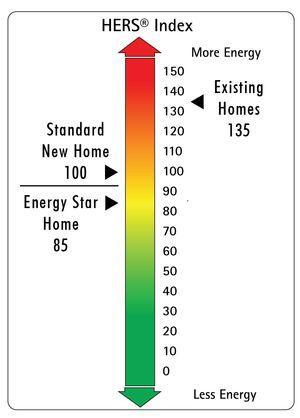 The HERS (Home Energy Rating System) Index was established by the Residential Energy Services Network (RESNET) in 2006. It is the nationally recognized scoring system for measuring a home's energy efficiency... sort of like an MPG (miles per gallon) sticker or Energy Star rating for a house.
The HERS (Home Energy Rating System) Index was established by the Residential Energy Services Network (RESNET) in 2006. It is the nationally recognized scoring system for measuring a home's energy efficiency... sort of like an MPG (miles per gallon) sticker or Energy Star rating for a house.
It is a way to give buyers and homeowners insight into how the home ranks in terms of energy efficiency. The lower a home's HERS Index, the more efficient the home.
A standard new home is referenced at 100... average score for existing homes is about 135... Energy Star Homes must score at least 85.
The HERS Index was added to the MLS this year, as a way for owners of energy efficient homes to share that information... and for buyers to search for energy efficient homes.
I just checked the MLS and there are currently only 26 properties listed with HERS scores, most of them new construction. However, I suspect interest in HERS ratings will grow and buyers will one day look for HERS scores on houses just as they look for efficiency ratings on a furnace. Even though not currently in demand by buyers, it can be a great marketing feature... especially if your home is not new yet energy efficient.
This is a relative scoring system that rewards efficiency, but does not take conservation into account. Just because a house has a low HERS Index doesn't necessarily mean your energy bills will be low... because as we all know, energy consumption is also driven by the size of the home as well as the living patterns of its occupants.
A comprehensive HERS home energy raing is the most in-depth energy perfomance assessment of a home that you will find. It includes testing using specialized equipment such as a blower door test, duct leakage tester, combustion analyzer and infrared cameras to determine:
- The amount and location of air leaks in the building envelope
- The amount of leakage from HVAC distribution ducts
- The effectiveness of insulation inside walls and ceilings
- Any existing or potential combustion safety issues
In addition, other things are taken into account, such as...
- Floors over unconditioned spaces like garages
- Attics, foundations and crawlspaces
- Windows and doors, vents and ductwork
- Water heating system and themostats
The score is calculated by comparing your home to a 'reference' new home of the same size and shape of your home. The index home is rated 100... if your home is better than the standard reference home, your score will be lower.
Sharlene Hensrud, RE/MAX Results - Email- Twin Cities Realtor
RELATED POSTS
- Radon Disclosure required in real estate transactions beginning January 1, 2014
- 9 Unexpected Energy (and Money) Savers

